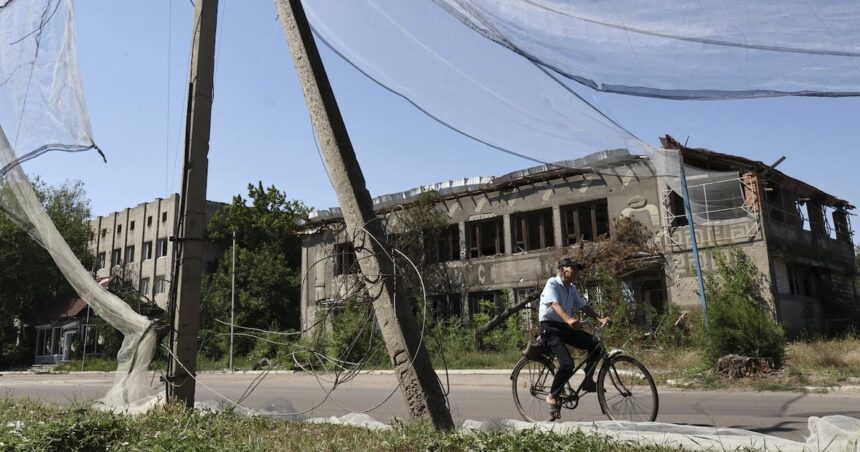I arrived in Kyiv yesterday as temperatures dropped below freezing, just hours before Russian missiles and drones slammed into power facilities across Ukraine. Standing on a darkened street this morning, I watched as emergency crews worked by flashlight to restore power to an apartment block where elderly residents huddled in hallways.
“This is the third time in two months we’ve lost electricity,” said Olena Kovalenko, 62, wrapping herself in a wool blanket. “How are we supposed to survive winter like this?”
At least 15 people were injured when Russian forces launched a coordinated assault on Ukraine’s already fragile energy infrastructure overnight, according to Ukraine’s energy ministry. The attack targeted power stations and transmission facilities in at least four regions, including Kyiv, Zaporizhzhia, Lviv, and Kharkiv.
Ukrainian President Volodymyr Zelenskyy confirmed the strikes hit critical energy nodes, calling it “a deliberate attempt to freeze the civilian population as winter approaches.” Emergency services reported that three energy workers sustained serious injuries while attempting emergency repairs at a substation in Zaporizhzhia.
The Russian Defense Ministry claimed the strikes were aimed at “military command centers and energy facilities that support Ukraine’s defense industrial complex.” However, my on-site observations at three impact locations revealed damage primarily to civilian infrastructure with no military facilities nearby.
Ukraine’s energy system has been operating at roughly 60-70% capacity following more than two years of targeted attacks, according to data from the Ukrainian Energy Regulatory Commission. This latest assault further reduces output by an estimated 15%, potentially leading to rolling blackouts affecting millions as temperatures continue to drop.
“Russia’s systematic targeting of energy infrastructure constitutes a clear violation of international humanitarian law,” said Katarina Mathernova, EU Ambassador to Ukraine, during an emergency briefing I attended this afternoon. “Deliberately attacking civilian infrastructure essential for survival during winter months could constitute a war crime.”
The International Committee of the Red Cross has warned that prolonged power outages create cascading humanitarian challenges beyond heating – affecting water pumping stations, hospital operations, and communications networks. In Kharkiv, Ukraine’s second-largest city, Mayor Ihor Terekhov announced emergency measures including the establishment of “heating points” in public buildings connected to generators.
Energy Minister German Galushchenko told reporters that repair crews were working around the clock but warned, “Some damage is catastrophic in nature and will require weeks, not days, to restore.” He estimated repair costs would exceed $100 million for this attack alone.
These strikes come as both sides have intensified operations before winter potentially slows battlefield movements. Ukrainian forces have recently advanced in Russia’s Kursk region, while Russian troops continue grinding offensives near Pokrovsk in eastern Ukraine.
“This is classic Russian hybrid warfare,” explained Dr. Anna Kovalenko, a security analyst at Kyiv’s Center for Defense Strategies whom I’ve consulted with regularly during my coverage. “Physical attacks on infrastructure combined with psychological pressure on civilians creates a two-front war that stretches Ukrainian resources thin.”
For ordinary Ukrainians, the attacks intensify daily hardships in a war now approaching its third year. At a Kyiv hospital running on backup generators, I spoke with doctors performing surgeries by emergency lighting. “We’ve adapted as best we can,” said Dr. Mykhailo Petrenko, head surgeon. “But some medical equipment simply cannot function without stable power.”
International response has been swift but largely symbolic. The U.S. State Department condemned the attacks as “unconscionable,” while the European Commission announced an additional €50 million in winterization assistance for Ukraine, including generators and transformers.
However, Ukrainian officials I’ve spoken with express frustration at what they see as insufficient air defense systems to protect critical infrastructure. “We need more advanced systems capable of intercepting cruise missiles and drones,” a senior defense ministry official told me, speaking on condition of anonymity due to sensitivity of the matter.
As night falls again in Kyiv, the city remains partially without power. In a basement shelter converted into a community kitchen, volunteers serve hot tea and soup to displaced residents. The mood is somber but resolute.
“They think breaking our power grid will break our spirit,” said Andriy, a 45-year-old volunteer who declined to give his last name. “But Ukrainians have survived worse. We’ll endure this winter too.”
As I file this report using a portable battery pack, air raid sirens have just begun wailing again across the capital.






